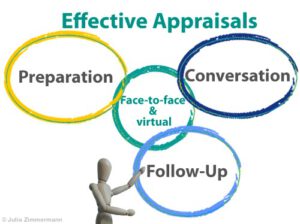How I follow up appraisals to make it valuable and continuous process
In part III, I outlined 9 key aspects of the most effective way of conducting an annual appraisal conversation either in a face-to-face or virtual setting. Here is the link so you can catch up.
With part IV I conclude this blog series with further tips on how to convert your annual appraisals into a continuous developmental experience for your direct reports.
Follow-up and continuous feedback:
For this phase -which generally lasts about 11 months- I consider three aspects most important that help you to have a highly effective appraisal process.
1. Pre- and post training conversations:
If you have a agreed that your direct reports would attend courses I highly recommend to have a conversation before he/she attends the course with a focus on what (s)he wants to learn through attending the course. As soon as (s)he is back from the course have another conversation to check what they have actually learned and how they will use their learning in the job and for themselves. With this your direct reports learning process will be more focused and their retention of coursed content will also be higher. You get more for your investment in the training!
2. Your role as mentor or coach:
Clarify with your direct report what your support role should be from her/his perspective and what it could be from your availability throughout the year. Agree a process or a structure how this support role could be brought to life. You could also consider some of your colleagues or other leaders in your organisation to act as a mentor for your direct reports.
3. Continuous feedback and its documentation:
Throughout the year make sure you have regular informal and formal feedback conversations. Ensure your conversations are overall in balance with praise and critique. Some researchers in the field of positive psychology actually found out that the ratio between critique and positive feedback which fosters high performance most is around 1:3.
Document the examples of your feedback conversations throughout the year. It makes your next appraisal relatively easy as it becomes a summary of all your feedback conversations throughout the year.
Summary: key tips for follow-up
1) Have pre-and post-training conversations about learning objectives and their application in the job.
2) Clarify your support role as mentor or coach with your direct reports.
3) Have regular feedback conversations and document these with specific examples.
I hope these tips around the preparation, conduct and follow-up of appraisal conversations will help you to have the most effective appraisals with your direct reports. Some of these points may seem to be over the top as they require quite a bit of time. From my personal experience following such a process, I can assure you, pays off in a great way as you have much easier conversations and generate higher levels of intrinsic motivation with your direct reports.
And if you are interested in a more detailed discussion on the subject, feel free to .
Or feel free to share your thoughts in the comments section below.
Thank you very much for your interest.



